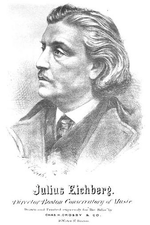Julius Eichberg

Julius Eichberg (13 June 1824 – 18 January 1893) was a German-born composer, musical director and educator who worked mostly in Boston, Massachusetts, in the United States.
Biography
Julius Eichberg was born in Düsseldorf, Germany on 13 June 1824. His first musical instruction came from his father whose pupil was an acceptable violin player by his seventh year. He also received instruction outside the family.[1] He attended the Musical Academy of Würzburg as a child. Upon the recommendation of Felix Mendelssohn, he entered the Brussels Conservatoire at the age of nineteen, where he took first prizes for violin playing and composition. He was a pupil of Belgian composer Charles Auguste de Bériot, studied composition under François-Joseph Fétis, and studied violin under Lambert Joseph Meerts. For eleven years he occupied the post of professor in the Conservatoire of Geneva.
In 1857 he came to the United States, staying two years in New York City and then proceeding to Boston, where he became the chef d'orchestre at the Boston Museum. In 1867 he founded and directed the Boston Conservatory of Music, and in the same year he was elected superintendent of music in the Boston Public Schools, which position he long held. He also founded the Eichberg Violin School.[1] He later composed symphonies and piano pieces. Julius Eichberg died in Boston on 19 January 1893.
Family
He married Sophie Mertens and they had one child, Annie Philippine Eichberg who was born in Geneva, Switzerland, c. 1856. Annie married twice: first to Tyler Batcheller King on 26 February 1884 and following his death to John Lane (publisher) on 13 August 1898. Annie Eichberg Lane was author of To Thee, O Country (national hymn) and of the books Brown's Retreat, Kitwyk, The Champagne Standard, Talk of the Town and According to Maria. She died in London on 23 January 1927.
Works
Eichberg published several educational works on music. As a composer he is particularly known for his three operettas, The Rose of Tyrol (1865), The Two Cadis (1868) and A Night in Rome, and with Benjamin Edward Woolf the opera The Doctor of Alcantara (1862).
Notes
- ↑ 1.0 1.1 Arthur Elson (1931). "Eichberg, Julius". Dictionary of American Biography. New York: Charles Scribner's Sons.
References
 Chisholm, Hugh, ed. (1911). "Eichberg, Julius". Encyclopædia Britannica (11th ed.). Cambridge University Press.
Chisholm, Hugh, ed. (1911). "Eichberg, Julius". Encyclopædia Britannica (11th ed.). Cambridge University Press. Wilson, James Grant; Fiske, John, eds. (1900). "Eichberg, Julius". Appletons' Cyclopædia of American Biography. New York: D. Appleton.
Wilson, James Grant; Fiske, John, eds. (1900). "Eichberg, Julius". Appletons' Cyclopædia of American Biography. New York: D. Appleton. "Eichberg, Julius". New International Encyclopedia. 1905.
"Eichberg, Julius". New International Encyclopedia. 1905.- "Obituary: Julius Eichberg". The New York Times. January 20, 1893.
External links
|